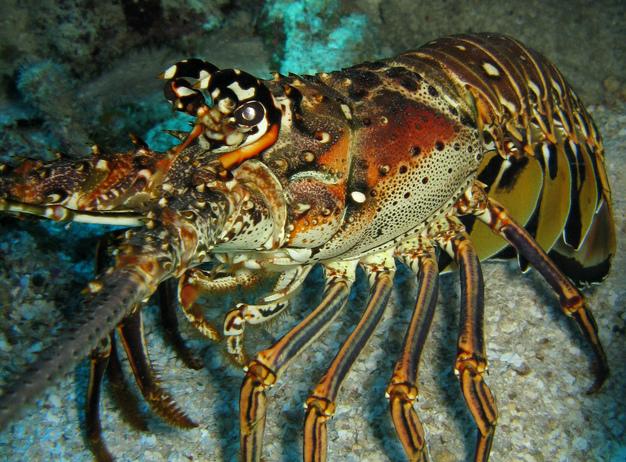
Credit: Clemson University College of Science
CLEMSON, South Carolina – A Clemson University researcher is studying how a new parasitic worm he discovered and named after comedian and late-night talk show host Conan O’Brien affects reproduction in the Caribbean spiny lobster.
J. Antonio Baeza, an associate professor with the College of Science’s Department of Biological Sciences, discovered the new species of nemertean worm belonging to the genus Carcinonemertes while researching parental behaviors and reproductive performance of the Caribbean spiny lobster Panulirus argus in the Florida Keys.
Caribbean spiny lobsters, which get their name from the forward-pointing spines that cover their bodies, live in the Atlantic Ocean’s tropical and subtropical waters as far north as North Carolina, as well as the Caribbean Sea and the Gulf of Mexico.
It is one of the most ecologically important and commercially lucrative species.
Caribbean spiny lobster landings have decreased over the past decade. Scientists are uncertain of the reason, although they have suggested several possibilities – overfishing, declining water quality, global climate change and environmental degradation. Caribbean spiny lobsters live in coral reefs, and scientists know coral reefs in the Florida Keys and Caribbean are dying at dramatic rates.
“We have this new parasite, too,” he said.
Baeza discovered the worm while studying active parental care behaviors in the Caribbean spiny lobsters P. argus, a large marine invertebrate. Females produce large broods of eggs, which they carry below their abdomens until they hatch. Baeza said that while brooding, female lobsters are “good mothers,” grooming and oxygenating their embryos.
“Reproductive parameters are important to understand for management of the fishery with a goal of sustainability,” he said.
His team of graduate and undergraduate researchers observed nemertean worms in the egg mass of a few of the gravid lobsters. Those broods had many dead embryos and empty embryo capsules.
Researchers tried to identify the worm based on published studies but found no information.
“That was surprising because there have been more than 50 years of intensive research given that the Caribbean spiny lobster is such an important species,” he said.
Baeza good-naturedly named the new parasite Carcinonemertes conanobrieni because its physical characteristics — a long body and pale color with slight tints of orange – reminded him of Conan O’Brien, who hosted “Late Night with Conan O’Brien,” “The Tonight Show” and “Conan.” The worm is about the size of a dog’s hair.
“When we discovered the worm, we wanted to know if this was a new species to science. Describing species is important, considering that the cataloging of the species living in this world is far from complete. We are also interested in the effect this worm might have on the reproductive performance of the lobster,” Baeza said.
Preliminary research shows that the worm, the first species of Carcinonemertes reported to infect the P. argus or any other lobster species in the Caribbean and western Atlantic Ocean, negatively affects brooding females’ reproductive performance.
“We need to confirm that information, and Clemson’s undergraduate students will be instrumental in achieving this goal,” he said.
The National Oceanic and Atmospheric Administration awarded Baeza a two-year, $298K grant this past summer to continue his research.
Caribbean spiny lobsters are vital for the marine ecosystem because they are prey for many predators, including sharks, large fish such as grouper and snapper, turtles and octopuses. They are predators, too, and eat snails, crabs and clams. The clams are part of a different tropic chain, so when lobsters eat them, they link tropic networks and the flow of energy through the entire ecosystem.
“They are really an important component to the community,” he said.
Baeza said the species sustains the most valuable fishery in the region, estimated to be worth $1 billion.
“A whole industry and coastal communities along the entire Caribbean basin rely on this species,” Baeza said.
Since Baeza discovered the worm, they have reportedly been found near Colombia in the south Caribbean Sea, the U.S. Virgin Islands and Costa Rica.
“Its presence is not only a concern for the Florida Keys but also for many locations in the Caribbean,” he said.
Baeza said he wants to explore the effect the parasite has on the host, the immediate impact on reproduction performance and the long-term effect on the population on the fishery. Baeza said that if researchers can understand the prevalence of the parasite and its effects, a modeling approach might predict future landings and inform those managing the fishery to minimize adverse effects.
###
This research is supported by the National Oceanic and Atmospheric Administration Award Number 0314-208-2014110 2020000734. The content is solely the responsibility of the authors and does not necessarily represent the official views of the NOAA.
Media Contact
Cindy Landrum
[email protected]
Original Source
https:/




